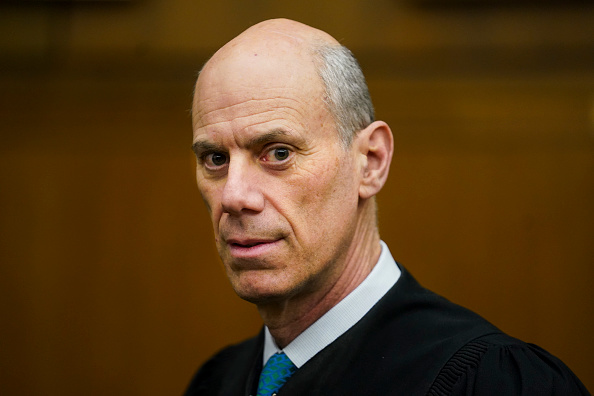Federal Judge Indicates Possible Contempt for Trump Administration’s Actions
April 16, 2025, 3:53 pm CDT
Chief U.S. District Judge James E. Boasberg of the District of Columbia, as seen in a portrait taken on March 16, 2023. (Photo by Carolyn Van Houten/The Washington Post via Getty Images)
In a significant ruling on April 16, 2025, Chief U.S. District Judge James E. Boasberg determined there is probable cause to hold the Trump administration in criminal contempt. This stems from their alleged failure to comply with his previous order that prohibited the transfer of Venezuelan immigrants to a prison in El Salvador.
During this ruling, Judge Boasberg announced intentions to provide the Trump administration a chance to rectify its alleged noncompliance. Should the administration fail to act accordingly, he intends to identify the individuals accountable for the disobedience, potentially leading to formal contempt charges that may require the involvement of an appointed prosecutor.
Judge Boasberg’s declaration followed another court order by U.S. District Judge Paula Xinis from Maryland, which demanded the administration explain its apparent mishandling in facilitating the release of an immigrant mistakenly sent to the El Salvadoran facility, a directive originally outlined by the U.S. Supreme Court on April 10.
Reports from multiple media outlets, including CNN, the Washington Post, Law360, and the New York Times, suggest that the administration’s ongoing tensions with both judges could signify a drift toward outright defiance regarding judicial orders.
Concerns of Defiance
Legal experts express concerns that the executive branch appears increasingly willing to challenge judicial authority, pushing boundaries to what may be considered lawful governance. Elora Mukherjee, a law professor at Columbia, remarked on the situation, suggesting that the administration seems intent on breaching the limits of constitutional authority. In her view, the current trajectory poses risks to the foundational principles of American democracy.
Judicial Expectations
In the context of the ruling by Judge Xinis, the administration’s argument that “facilitating” the immigrant’s return means merely removing domestic barriers to their return was met with skepticism. Cornell Law School professor Michael Dorf criticized this stance, describing it as “laughable,” emphasizing that sound legal reasoning should meet higher standards of credibility.
The New York Times noted that acts of defiance might not always manifest as overt refusals to comply with judicial orders. Instead, they may take the form of inadequate legal representation or presenting arguments lacking substantial merit, signaling a troubling trend in administrative compliance.
Potential Consequences
Despite a recent Supreme Court ruling indicating a procedural misstep in the initial case, Judge Boasberg asserted that this does not absolve the government from accountability for its actions. He emphasized, “Every judicial order must be obeyed until it is reversed,” reinforcing the expectation that defiance against court orders will incur repercussions.
He clarified that the Trump administration could mitigate its contempt status by allowing deportees sent to El Salvador a fair opportunity to dispute their removal via a habeas corpus proceeding. Importantly, this would not necessitate the physical return of the individuals, merely an acknowledgment of their legal rights.
Should the government fail to remedy the situation, Judge Boasberg signaled the possibility of requiring further disclosures and testimonies, advancing the contempt process that could eventually lead to prosecution by the Department of Justice or an appointed independent prosecutor if the DOJ declines to act.
The Trump administration has reportedly indicated plans to pursue “immediate appellate relief” in response to Judge Boasberg’s recent ruling, signaling that the legal battles surrounding these immigration policies are far from over.
The ongoing case is identified as J.G.G. v. Trump.

